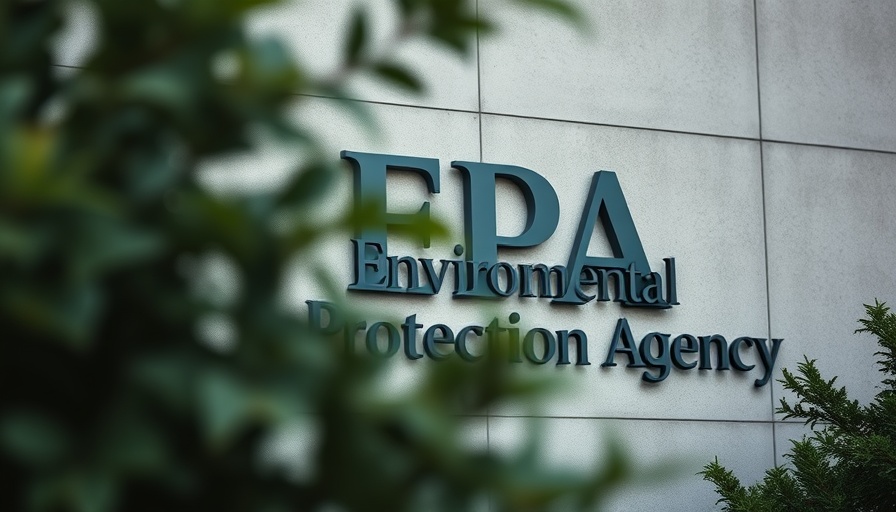
The EPA’s Dismissal of Whistleblowers: A National Concern
The recent decision by the Environmental Protection Agency (EPA) to place 139 employees on leave following their outspoken criticism of former President Trump's environmental policies has sparked widespread debate. This action has raised important questions regarding government accountability and the protection of whistleblowers in sensitive sectors. Whistleblower protections are crucial as they encourage individuals to report misconduct without fear of retaliation, ensuring transparency within government agencies.
Historical Context: Whistleblowing in the Federal Government
Whistleblower protections have been a contentious issue in U.S. politics, especially during administrations that focus on deregulation. Historical instances, such as the tobacco whistleblower Jeffrey Wigand or the Pentagon Papers, illustrate the vital role that whistleblowers play in safeguarding public interest. The EPA's current action marks a stark contrast to these past instances where whistleblowers were often celebrated as heroes. It begs the question: how are we valuing the voices that seek to preserve our environment?
Social Implications of EPA's Decision
For many, this decision serves as a cautionary tale about the risks faced by employees in federal agencies when speaking out. The social connection here is profound; these employees are not only defending their workplace rights but also advocating for public health and safety. The ramifications of this gag order extend beyond individual careers—it sends a message to all public servants that speaking out against unsound policies could jeopardize their livelihoods. Citizens must ponder the implications of a government where such silencing becomes normalized.
Future Predictions: The Trajectory of Environmental Policy
As we move deeper into a climate crisis, the repercussions of this action could hinder the EPA’s ability to effectively implement policies that safeguard the environment. Future predictions indicate a possible decline in morale and innovation within the agency, as employees may fear repercussions for voicing environmental concerns. A decline in confidence in the EPA could lead to lax enforcement of regulations, posing far-reaching risks to public health and safety.
Counterarguments: Support for Management?
While many criticize the EPA’s actions, some defend the agency's authority to manage internal affairs. Proponents of this stance argue that federal agencies must maintain order and discipline among employees, especially when comments made could be perceived as harmful to national interests. This perspective emphasizes the delicate balance that must be maintained between employee freedom and agency integrity. However, it raises a fundamental question: Should the fear of reprisal outweigh the pursuit of ethical governance?
Relevance to Current Events: Public Response and Civic Engagement
The public's response to the EPA's actions has been vibrant, with calls for protests and advocacy for stronger whistleblower protections. Civic engagement is crucial in shaping environmental policies, and the current situation presents an opportunity for citizens to become more involved. Activism during this critical time could lead to legislative changes protecting whistleblowers within federal agencies, creating a landscape where ethical environmental stewardship thrives.
Taking Action: What Can You Do?
As concerned citizens, it is our duty to support transparency and accountability in government. Here are a few actionable steps to take:
- Stay informed: Follow EPA news and understand the implications of their policies on your community.
- Advocate: Join local and national movements that support environmental justice and whistleblower protections.
- Engage: Write to your congressional representatives expressing your views on the importance of whistleblower protections within government agencies.
This isn't just about the 139 employees on leave—it's about ensuring that our voices are heard, and that the environment is protected for future generations. The time to act is now; the stakes have never been higher.
Conclusion: A Call for Unity and Action
The decision by the EPA to discipline employees who speak out against the mismanagement of environmental policy reminds us of the fragile state of whistleblower protections in government. As citizens, we must engage with the issues at hand—advocate for our planet, support transparency, and demand accountability. By staying informed and actively participating in shaping our public policies, we can ensure a future where our environment and those who protect it are valued. Together, we can voice our beliefs and make a tangible impact both locally and nationally.
 Add Element
Add Element  Add Row
Add Row 



 Add Row
Add Row  Add
Add 


Write A Comment